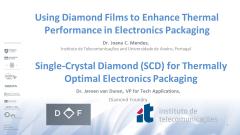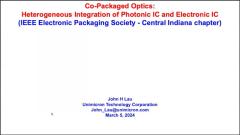(36:20 + Q&A) Dr. Farnood Rezaie, Technology and Quality, Cisco Systems
Summary: While today’s optical networks require scalable transceiver technologies such as silicon photonics (SiPh), these networking products need to be reliable for long-term use in datacenter networks. Passive SiPh components such as waveguides, splitters, couplers, polarization splitters and/or rotators and multiplexers/de-multiplexers usually have less stringent reliability requirements while active SiPh components such as integrated lasers, modulators, photodiodes, and thermal tuners need to be investigated with more comprehensive ageing and stress-test schemes. For passive optical elements, the focus of early reliability assessments (ERA) are accelerated life test, high temperature stress test (HTS), unbiased damp heat test (UBDH), temperature cycling test, high temperature lifetime (HTOL) and electrostatic discharge (ESD) tests while active optical components need to be tested with additional testing schemes such as diode breakdown voltage (used for both modulator and photodiodes), reverse bias electrical test, time-dependent and reverse bias wear-out test, high optical power stress test and hot carrier injection test (for photodiodes) to better understand and predict the potential failure mechanisms. Micro-optic lifetime testing of these components can be performed and evaluated for both hermetic and non-hermetic designs and eventually needs to be defined and standardized across the industry. In this talk, we will review the state of optoelectronic reliability efforts for SiPh platforms at Cisco.
Farnood Rezaie is a member of Cisco’s Technology and Quality team that develops optical interconnect solutions. His background and expertise are in developing, prototyping and qualifying silicon photonics (SiPh) based products. Previously at Tower Semiconductor, he developed and scaled up SiPh foundry processes that are being used for high-volume transceivers and optical sensors. Before Tower, he worked at Skorpios technologies where he developed heterogeneously integrated SiPh transceivers. Farnood received his PhD from University of Central Florida (UCF) in 2015 and BS in optical physics from University of Tehran in 2009.
For videos/slides from other talks at the Symposium on Reliability of Electronics and Photonics Packaging (REPP'22), please visit our website and join our IEEE Dlist: attend.ieee.org/repp
(36:20 + Q&A) Dr. Farnood Rezaie, Technology and Quality, Cisco Systems
Summary: While today’s optical networks require scalable transceiver technologies such as silicon photonics (SiPh), these networking products need to be reliable for long-term use in datacenter networks. Passive SiPh components such as waveguides, splitters, couplers, polarization splitters and/or rotators and multiplexers/de-multiplexers usually have less stringent reliability requirements while active SiPh components such as integrated lasers, modulators, photodiodes, and thermal tuners need to be investigated with more comprehensive ageing and stress-test schemes....
 Cart
Cart Create Account
Create Account Sign In
Sign In





